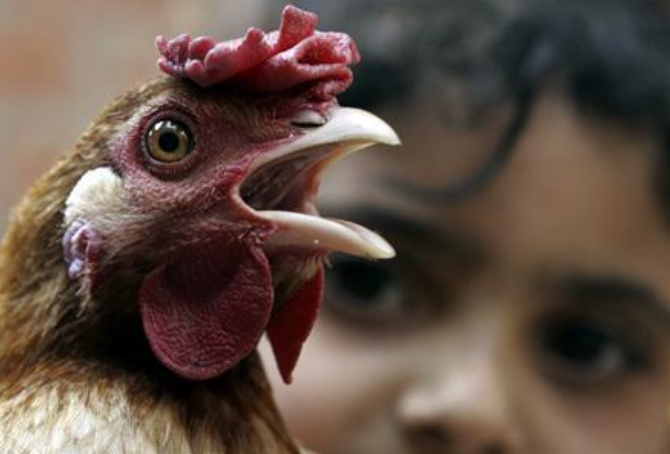
The Ministry of Agriculture has announced putting into effect a law that bars the transport or sale of live birds or poultry.
Enforcing the 2009 law aims to combat environmental pollution and prevents the spread of diseases like bird flu (H5N1).
The World Health Organization (WHO) identifies the H5N1 as a type of influenza virus that can cause disease in humans ranging from a mild illness to death.
The law also bars transporting or selling waste from infected farms.
Deputy Minister of Agriculture for livestock and poultry production Mona Mahrez said in press remarks that the law, which has been around for around nine years, addresses all the details regarding poultry and live birds trade, including the related environmental and health concerns.
Mahrez added that the law prohibits poultry shop owners to sell live birds; it also requires them to refrigerate their meat products.
A draft law was proposed by former president Hosni Mubarak in 2007 to bar trade and transport of live birds to contribute in preventing the spread of the H5N1 bird flu.
Violators according to the 2007 draft law could face a 6-month jail term and a fine of up to 10,000 Egyptian pounds.
Moreover, the law stipulates that poultry should only be transported to licensed slaughterhouses after traders get licensed after veterinary inspections. This is a necessary step before offering the products at shops.
Although the law was in effect in 2009 and 2010, it has not been enforced since due to the security unrest that hit Egypt following the January 25, 2011 revolution.
The first phase of the law will include banning the trade of live poultry and bids in Cairo and Giza, which according to Mehrez consume around 30% of the country’s poultry consumption. It will then be implemented in Alexandria and other governorates after the first stage is complete.
“Egypt has a sufficient number of slaughterhouses, which currently operate at only 10 percent of their total capacity,” Mehrez added.
The ministry will also ink a cooperation protocol with the Fund for SMEs Development to provide poultry shop owners with soft loans to purchase the necessary equipment and refrigerators for the implementation of the law.
For his part, head of the General Federation of Poultry (GFP) Nabil Darwish, has affirmed that the legislation will help Egypt eliminate the spread of bird flu, pointing out that it will also create new job opportunities.
Darwish referred to a number of procedures and steps that will precede the implementation of the law, including the provision of refrigerators, ensuring that birds are being slaughtered at licensed slaughterhouses and finding solutions for poulterer who might get affected by the decision.
The GFP head told Al-Masry Al-Youm in an interview that the law also seeks to balance prices of the poultry market through balancing production and marketing costs with the final price.
The law, according to Darwish, also reduces the risk of selling poultry by converting it to a sustainable product for the greater good of the public.
He pointed out that the way poultry industry and business is being done in the country does not comply with biosecurity preventive measures, which were designed to reduce the risk of transmission of infectious diseases in crops, livestock and quarantined pests.
Recently, widespread H5N1 infections in poultry and a substantial increase in the number of human cases of H5N1 infection were observed, according to the U.S. National Library of Medicine.
Head of the Veterinary Medicine Directorate, Dr. Ashraf Tawfik, said the directorate, along with the health ministry, is collaborating with the security directorate to set security checkpoints to monitor any attempts to illegally trade poultry.
He added that inspection and awareness campaigns will be organized to ensure effective implementation to the law.
An unprecedented increase in the number of human infections with the avian influenza virus was observed in Egypt during the 2014–15 winter season; WHO reported that 31 cases were confirmed in 2014, of which 27 were in persons infected as of September.
For his part, MP Ihab Ghatati demanded the government to cancel the anticipated law and set a plan to develop poultry industry in Egypt.
“This decision would benefit a small group of companies that have big abattoirs,” Ghatati stressed. “Instead, the government should’ve set a new strategy to develop this industry and poultry shops and then launch a campaign to change the taste of consumers… people do not trust slaughtered chicken, they got used to seeing the bird alive before slaughtering it.”
He also pointed out that poultry is the main industry in some governorates, such as Faiyum and Qalyubia, and that banning birds trade in these places will significantly plummet their economy.
The Ministry of Health and Population in Egypt confirmed 31 cases in 2014 and 88 in 2015’s January and February. Thus, the official number of cases during September 2014–February 2015 was 114, including 36 deaths.
Farms, abattoirs, backyard flocks, and live bird markets located in different governorates in Egypt will be sampled on a monthly basis regardless of the presence of disease symptoms in poultry after the law comes into effect. In each governorate, the same locations will continuously be sampled by a poultry veterinarian.
Historically, the government of Egypt has adopted a number of mechanisms aimed at limiting the spread of avian flu, with varying degrees of success, since the subtype ‘H5N1’ virus was first reported in poultry in 2006 and was declared to be enzootic in 2008. However, the virus continued to circulate, and infections were reported in more governorates.




